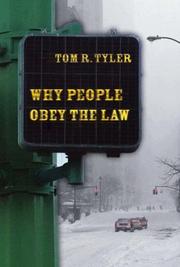| Listing 1 - 10 of 22 | << page >> |
Sort by
|

ISBN: 0805828494 0805828508 9780805828498 Year: 1999 Publisher: Hillsdale Erlbaum
Abstract | Keywords | Export | Availability | Bookmark
 Loading...
Loading...Choose an application
- Reference Manager
- EndNote
- RefWorks (Direct export to RefWorks)
Social psychology --- Social psychology. --- Self. --- Group identity. --- Psychologie sociale --- Moi (Psychologie) --- Identité collective --- Self --- Group identity --- Identité collective --- Mass psychology --- Psychology, Social --- Personal identity --- Collective identity --- Community identity --- Cultural identity --- Social identity --- Human ecology --- Psychology --- Social groups --- Sociology --- Consciousness --- Individuality --- Mind and body --- Personality --- Thought and thinking --- Will --- Identity (Psychology) --- Collective memory
Book
ISBN: 0300044038 0300052359 9780300044034 9780300052350 Year: 1990 Publisher: New Haven, Conn. Yale University Press
Abstract | Keywords | Export | Availability | Bookmark
 Loading...
Loading...Choose an application
- Reference Manager
- EndNote
- RefWorks (Direct export to RefWorks)
Public law. Constitutional law --- Sociology of law --- Psychology and law --- Justice, Administration of --- -Law --- -Punishment --- -Public opinion --- Public opinion --- Philosophy --- -Penalties (Criminal law) --- Penology --- Corrections --- Impunity --- Retribution --- Opinion, Public --- Perception, Public --- Popular opinion --- Public perception --- Public perceptions --- Judgment --- Social psychology --- Attitude (Psychology) --- Focus groups --- Reputation --- Acts, Legislative --- Enactments, Legislative --- Laws (Statutes) --- Legislative acts --- Legislative enactments --- Jurisprudence --- Legislation --- Administration of justice --- Law --- Courts --- Law and legislation --- Punishment --- Public opinion. --- Justice [Administration of ] --- Illinois (Etat) --- Chicago (Ill.) --- Law - Philosophy - Public opinion. --- Justice, Administration of - Public opinion. --- Punishment - Public opinion. --- Public opinion - Illinois - Chicago. --- Penalties (Criminal law) --- Philosophy&delete& --- Justice, Administration of - Public opinion --- Law - Public opinion - Philosophy --- Punishment - - Public opinion --- Public opinion - - Chicago - Illinois --- -Justice, Administration of --- -Sociology of law

ISBN: 9780691126739 0691126739 Year: 2006 Publisher: Princeton Princeton University Press
Abstract | Keywords | Export | Availability | Bookmark
 Loading...
Loading...Choose an application
- Reference Manager
- EndNote
- RefWorks (Direct export to RefWorks)
Law --- Justice, Administration of --- Punishment --- Public opinion --- Philosophy --- Public opinion. --- psychologie --- gedrag --- psychologie, sociaal --- sociologie --- #SBIB:324H60 --- 316.334.4 --- Opinion, Public --- Perception, Public --- Popular opinion --- Public perception --- Public perceptions --- Judgment --- Social psychology --- Attitude (Psychology) --- Focus groups --- Reputation --- Acts, Legislative --- Enactments, Legislative --- Laws (Statutes) --- Legislative acts --- Legislative enactments --- Jurisprudence --- Legislation --- Administration of justice --- Courts --- Penalties (Criminal law) --- Penology --- Corrections --- Impunity --- Retribution --- 316.334.4 Rechtssociologie --- Rechtssociologie --- Philosophy&delete& --- Politieke socialisatie --- Law and legislation --- Law - Philosophy - Public opinion --- Justice, Administration of - Public opinion --- Punishment - Public opinion --- Public opinion - Illinois - Chicago --- Droit --- Justice --- Peines --- Opinion publique --- Philosophie --- Opinion publique. --- Administration --- Psychologie du droit --- Psychological aspects. --- Aspect psychologique.
Book
ISBN: 9780691158006 9780691146904 069114690X Year: 2011 Publisher: Princeton, N.J. Princeton University Press
Abstract | Keywords | Export | Availability | Bookmark
 Loading...
Loading...Choose an application
- Reference Manager
- EndNote
- RefWorks (Direct export to RefWorks)
Motivation (Psychology) --- Cooperativeness. --- Social aspects. --- Economic order --- Social aspects --- Motivation (Psychology) - Social aspects

ISBN: 0754625230 Year: 2005 Publisher: Aldershot Ashgate
Abstract | Keywords | Export | Availability | Bookmark
 Loading...
Loading...Choose an application
- Reference Manager
- EndNote
- RefWorks (Direct export to RefWorks)
Justice. --- Procedure (Law) --- Sociological jurisprudence. --- Psychological aspects. --- Sociological aspects. --- Justice --- Sociological jurisprudence --- Law --- Law and society --- Society and law --- Sociology of law --- Jurisprudence --- Sociology --- Law and the social sciences --- Adjective law --- Legal procedure --- Practice (Legal procedure) --- Procedural law --- Injustice --- Conduct of life --- Common good --- Fairness --- Psychological aspects --- Sociological aspects --- Practice --- Procedure
Book
ISBN: 1282721976 9786612721977 1400836662 9781400836666 9780691146904 069114690X Year: 2010 Publisher: Princeton, NJ
Abstract | Keywords | Export | Availability | Bookmark
 Loading...
Loading...Choose an application
- Reference Manager
- EndNote
- RefWorks (Direct export to RefWorks)
Any organization's success depends upon the voluntary cooperation of its members. But what motivates people to cooperate? In Why People Cooperate, Tom Tyler challenges the decades-old notion that individuals within groups are primarily motivated by their self-interest. Instead, he demonstrates that human behaviors are influenced by shared attitudes, values, and identities that reflect social connections rather than material interests. Tyler examines employee cooperation in work organizations, resident cooperation with legal authorities responsible for social order in neighborhoods, and citizen cooperation with governmental authorities in political communities. He demonstrates that the main factors for achieving cooperation are socially driven, rather than instrumentally based on incentives or sanctions. Because of this, social motivations are critical when authorities attempt to secure voluntary cooperation from group members. Tyler also explains that two related aspects of group practices--the use of fair procedures when exercising authority and the belief by group members that authorities are benevolent and sincere--are crucial to the development of the attitudes, values, and identities that underlie cooperation. With widespread implications for the management of organizations, community regulation, and governance, Why People Cooperate illustrates the vital role that voluntary cooperation plays in the long-standing viability of groups.
Motivation (Psychology) --- Action, Psychology of --- Drive (Psychology) --- Psychology of action --- Psychology --- Social aspects. --- Cooperation. --- Collaborative economy --- Cooperative distribution --- Cooperative movement --- Distribution, Cooperative --- Peer-to-peer economy --- Sharing economy --- Economics --- Profit-sharing --- Motivation (Psychology) - Social aspects
Book
ISBN: 9789058503206 Year: 2007 Publisher: Nijmegen Wolf
Abstract | Keywords | Export | Availability | Bookmark
 Loading...
Loading...Choose an application
- Reference Manager
- EndNote
- RefWorks (Direct export to RefWorks)
Book
ISBN: 9781839109720 9781839109744 1839109726 Year: 2022 Publisher: Northampton : Edward Elgar Publishing,
Abstract | Keywords | Export | Availability | Bookmark
 Loading...
Loading...Choose an application
- Reference Manager
- EndNote
- RefWorks (Direct export to RefWorks)
"Elgar Advanced Introductions are stimulating and thoughtful introductions to major fields in the social sciences, business and law, expertly written by the world's leading scholars. Designed to be accessible yet rigorous, they offer concise and lucid surveys of the substantive and policy issues associated with discrete subject areas. Leading scholar Tom R. Tyler provides a timely and engaging introduction to the field of law and psychology. This Advanced Introduction outlines the main areas of research, their relevance to law and the way that psychological findings have shaped - or failed to shape - the corresponding areas of law. Key features include: - broad coverage of the key topics in the field - accessible, non-technical presentation of research findings - focus on the relevance of psychological theories to topics in law - emphasis on the institutional realities within which law functions - discussion of the problems of bringing research findings into the legal system. Presenting an informative overview of this rapidly developing area, the Advanced Introduction to Law and Psychology will be a key resource for students and scholars of law, psychology and the social sciences. It will also be of benefit to psychologists and legal practitioners"--

ISBN: 9780871548764 Year: 2007 Publisher: New York : Russell Sage Foundation,
Abstract | Keywords | Export | Availability | Bookmark
 Loading...
Loading...Choose an application
- Reference Manager
- EndNote
- RefWorks (Direct export to RefWorks)
Criminal justice, Administration of. --- Law enforcement. --- Social policy.
Book
ISBN: 1400828600 Year: 2006 Publisher: Princeton, NJ
Abstract | Keywords | Export | Availability | Bookmark
 Loading...
Loading...Choose an application
- Reference Manager
- EndNote
- RefWorks (Direct export to RefWorks)
People obey the law if they believe it's legitimate, not because they fear punishment--this is the startling conclusion of Tom Tyler's classic study. Tyler suggests that lawmakers and law enforcers would do much better to make legal systems worthy of respect than to try to instill fear of punishment. He finds that people obey law primarily because they believe in respecting legitimate authority. In his fascinating new afterword, Tyler brings his book up to date by reporting on new research into the relative importance of legal legitimacy and deterrence, and reflects on changes in his own thinking since his book was first published.
Punishment --- Public opinion --- Law --- Justice, Administration of --- Public opinion. --- Philosophy --- Illinois --- Adaptation level theory. --- Affective attachments, and diffuse support. --- Bargainer's dilemma. --- Bias. --- Calls to police, in study sample. --- Courts. --- Decision control. --- Decision making. --- Diffuse support. --- Disputes. --- Distributive justice. --- Drunk driving. --- Economic perspective on compliance. --- Evaluation models. --- Expected utility models. --- False consciousness. --- Favorable affective orientation. --- Formal procedures. --- Good faith of decision makers. --- Group loyalty. --- Group value model. --- Informal procedures. --- Internalized obligations. --- Involuntary contacts. --- Judges. --- Legitimacy. --- Local government. --- Motivations of authorities. --- Noninstrumental issues. --- Norms. --- Panel design. --- Parole hearings. --- Peer disapproval. --- Personal characteristics. --- Policy. --- Political psychology. --- Procedural consensus. --- Procedural fairness. --- Public choice theory. --- Public support for authorities. --- Relative deprivation theory. --- Self-interest: long-term. --- Sentencing. --- Social control. --- Social exchange model. --- Social relations. --- Sociology. --- Tax evasion. --- Telephone interviews. --- Values.
| Listing 1 - 10 of 22 | << page >> |
Sort by
|

 Search
Search Feedback
Feedback About UniCat
About UniCat  Help
Help News
News